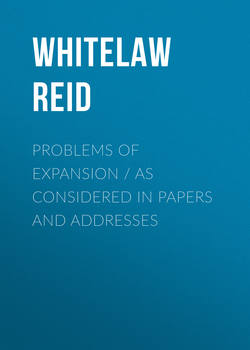Problems of Expansion. As Considered in Papers and Addresses

Реклама. ООО «ЛитРес», ИНН: 7719571260.
Оглавление
Whitelaw Reid. Problems of Expansion. As Considered in Papers and Addresses
PREFATORY NOTE
I. THE TERRITORY WITH WHICH WE ARE THREATENED
II. WAS IT TOO GOOD A TREATY?
III. PURPORT OF THE TREATY
IV. THE DUTIES OF PEACE
V. THE OPEN DOOR
VI. SOME CONSEQUENCES OF THE TREATY OF PARIS
VII. OUR NEW DUTIES
VIII. LATER ASPECTS OF OUR NEW DUTIES
IX. A CONTINENTAL UNION
X. OUR NEW INTERESTS
XI "UNOFFICIAL INSTRUCTIONS"
APPENDICES
1. POWER TO ACQUIRE AND GOVERN TERRITORY
2. THE TARIFF IN UNITED STATES TERRITORY
3. THE RESOLUTIONS OF CONGRESS AS TO CUBA
4. THE PROTOCOL OF WASHINGTON
5. THE PEACE OF PARIS
Отрывок из книги
Men are everywhere asking what should be our course about the territory conquered in this war. Some inquire merely if it is good policy for the United States to abandon its continental limitations, and extend its rule over semi-tropical countries with mixed populations. Others ask if it would not be the wisest policy to give them away after conquering them, or abandon them. They say it would be ruinous to admit them as States to equal rights with ourselves, and contrary to the Constitution to hold them permanently as Territories. It would be bad policy, they argue, to lower the standard of our population by taking in hordes of West Indians and Asiatics; bad policy to run any chance of allowing these people to become some day joint arbiters with ourselves of the national destinies; bad policy to abandon the principles of Washington's Farewell Address, to which we have adhered for a century, and involve ourselves in the Eastern question, or in the entanglements of European politics.
The men who raise these questions are sincere and patriotic. They are now all loyally supporting the Government in the prosecution of the war which some of them were active in bringing on, and others to the last deprecated and resisted. Their doubts and difficulties deserve the fairest consideration, and are of pressing importance.
.....
What, then, can we do with them? Shall we trade them for something nearer home? Doubtless that would be permissible, if we were sure of thus securing them a better government than that of Spain, and if it could be done without precipitating fresh international difficulties. But we cannot give them to our friend and their neighbor Japan without instantly provoking the hostility of Russia, which recently interfered to prevent a far smaller Japanese aggrandizement. We cannot give them to Russia without a greater injustice to Japan; or to Germany or to France or to England without raising far more trouble than we allay. England would like us to keep them; the Continental nations would like that better than any other control excepting Spain's or their own; and the Philippines would prefer it to anything save the absolute independence which they are incapable of maintaining. Having been led into their possession by the course of a war undertaken for the sake of humanity, shall we draw a geographical limit to our humanity, and say we cannot continue to be governed by it in Asiatic waters because it is too much trouble and is too disagreeable—and, besides, there may be no profit in it?
Both war and diplomacy have many surprises; and it is quite possible that some way out of our embarrassing possession may yet be found. The fact is clear that many of our people do not much want it; but if a way of relinquishing it is proposed, the one thing we are bound to insist on is that it shall be consistent with our attitude in the war, and with our honorable obligations to the islands we have conquered and to civilization.
.....